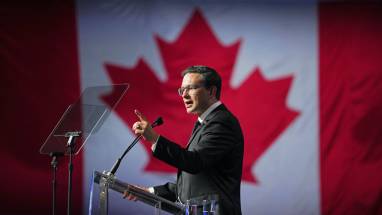Tory government gives extra pay to political staff, non-unionized managers
Read this article for free:
or
Already have an account? Log in here »
To continue reading, please subscribe:
Monthly Digital Subscription
$0 for the first 4 weeks*
- Enjoy unlimited reading on winnipegfreepress.com
- Read the E-Edition, our digital replica newspaper
- Access News Break, our award-winning app
- Play interactive puzzles
*No charge for 4 weeks then price increases to the regular rate of $19.00 plus GST every four weeks. Offer available to new and qualified returning subscribers only. Cancel any time.
Monthly Digital Subscription
$4.75/week*
- Enjoy unlimited reading on winnipegfreepress.com
- Read the E-Edition, our digital replica newspaper
- Access News Break, our award-winning app
- Play interactive puzzles
*Billed as $19 plus GST every four weeks. Cancel any time.
To continue reading, please subscribe:
Add Free Press access to your Brandon Sun subscription for only an additional
$1 for the first 4 weeks*
*Your next subscription payment will increase by $1.00 and you will be charged $16.99 plus GST for four weeks. After four weeks, your payment will increase to $23.99 plus GST every four weeks.
Read unlimited articles for free today:
or
Already have an account? Log in here »
Hey there, time traveller!
This article was published 12/09/2022 (1182 days ago), so information in it may no longer be current.
Political appointees who work for the province are getting an extra pay bump, riling the union and labour organizations that had to take the Tory government to court over its contentious wage-freeze legislation.
A “special wage adjustment” of an additional one per cent will be paid to 929 full-time employees, or 7.9 per cent of the workforce, a provincial government spokesman has confirmed.
“It’s outrageous that this government is giving its own political staff and senior executives an extra wage increase over what they give the front-line workers who earn much less,” said Kyle Ross, president of the Manitoba Government and General Employees’ Union.

JESSICA LEE / WINNIPEG FREE PRESS FILES
Manitoba Government and General Employees' Union president Kyle Ross.
Political staff and executives are getting a 2.4 per cent pay bump, while regular civil servants are receiving a 1.4 per cent increase retroactive to March 30, 2019. The one per cent increase is over and above what other civil servants are getting as part of a four-year Manitoba government employees master agreement the province recently signed with the MGEU.
“I’m sure our members are going to be very frustrated when they find this out,” Ross said.
The government says the extra pay for political staff and executives, such as assistant deputy ministers, is warranted.
“In an effort to address ongoing recruitment and retention challenges, an additional one per cent special wage adjustment was approved, retroactive to March 30, 2019, for non-represented employees classified in the non-represented and executive pay schedules,” the government spokesman said in an email.
“This also recognizes that in the past there have been times when special wage adjustments were awarded for (unionized) employees, but not for non-(unionized) employees,” he said.
“It’s outrageous that this government is giving its own political staff and senior executives an extra wage increase over what they give the front-line workers who earn much less.”–Kyle Ross, president of the Manitoba Government and General Employees’ Union
The government does not appear to have any trouble recruiting political staff, the MGEU said. It cited orders in council that show the hiring of 28 political staff so far this year, earning a payroll of $2.1 million.
“It speaks volumes about how the premier and cabinet operate,” said Ross. “They’re obviously far more concerned with rewarding their own and those at the top than they are with fairness for the working men and women who keep this province’s services going,” Ross said. “They show up every day and provide services to Manitobans and expect to be treated fairly.”
The president of the Manitoba Federation of Labour was flabbergasted by the one per cent extra pay increase for “hand-picked” employees. The federation was part of a coalition of 28 unions that took the Progressive Conservative government to court over its wage-freeze legislation in 2019.
“I am a little bit blown away,” Kevin Rebeck said Monday. “We were literally in court over them mandating zeroes for over 100,000 public-sector workers,” Rebeck said. “They were putting in law that ‘you get nothing.’ Now, they want to retroactively award their appointees? That says something about this government and how it views public-sector workers,” he said.
Labour Minister Reg Helwer — whose government repealed its wage-freeze legislation this year — did not respond to a request for an interview or issue a comment.
“We were literally in court over them mandating zeroes for over 100,000 public-sector workers. They were putting in law that ‘you get nothing.’ Now, they want to retroactively award their appointees? That says something about this government and how it views public-sector workers.”–Kevin Rebeck, president of the Manitoba Federation of Labour
The 2017 Public Sector Sustainability Act demanded wage freezes in the first two years of any new public-sector union contract, followed by increases of no more than 0.75 per cent and one per cent in years 3 and 4.
The wage-freeze bill was never proclaimed into law, but set the tone when the MGEU began bargaining in 2019 after its collective master agreement had expired.
In the fall of 2019, then-finance minister Scott Fielding refused MGEU’s request to allow an arbitration board settle the contract, after the union deemed bargaining had reached an impasse. The union took the government to court. Ultimately, an arbitration board awarded the 12,000 MGEU members pay increases of 1.4 per cent in March 2019, 0.5 per cent in 2020, 1.65 per cent in 2021, and two per cent effective March 26, 2022.
Rebeck said the PC government’s decision to give appointees 2.4 per cent in 2019 — an extra one per cent “gift” — is a “bit of a shock.”
“We’re all feeling the pinch of inflation and costs, but (the government) really put public-sector workers, who’ve been on the front lines for us, through the ringer to go through a bargaining process,” he said.

MIKE DEAL / WINNIPEG FREE PRESS FILES
Kevin Rebeck, president of the Manitoba Federation of Labour.
“It seems grossly unfair for the government to pick favourites like that — for their hand-picked friends and staff who work directly for them to get something that other workers won’t get because this government’s been so stubborn at the bargaining table and unwilling to recognize the work of hard-working public servants,” Rebeck said.
carol.sanders@freepress.mb.ca

Our newsroom depends on a growing audience of readers to power our journalism. If you are not a paid reader, please consider becoming a subscriber.
Our newsroom depends on its audience of readers to power our journalism. Thank you for your support.





